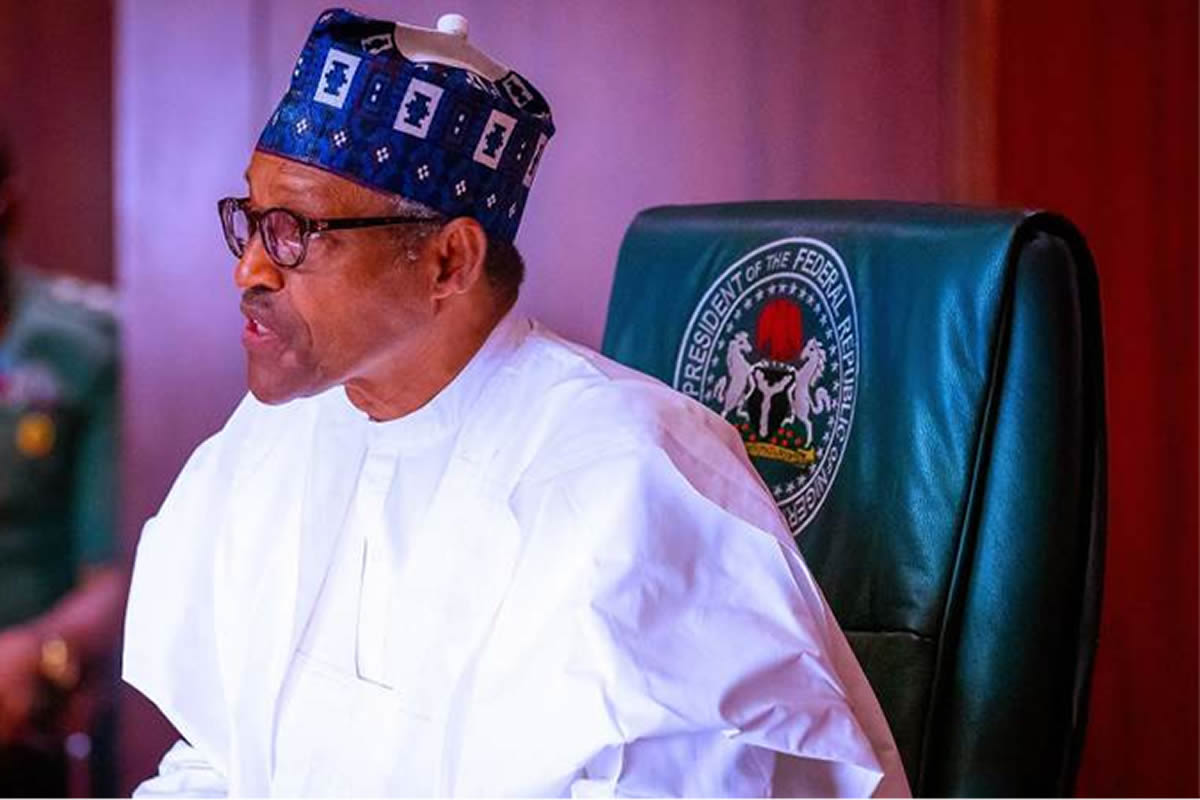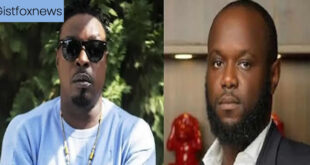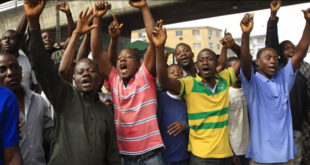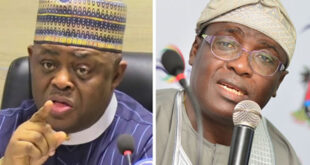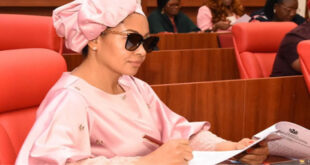By Dr. Ugoji Egbujo It’s six years since President Buhari. The country we have today wasn’t the country we envisaged in 2015. Hate and political bitterness, clannishness and nepotism, handcuffed us. Our divisions have become sharper than double-edged swords. Whether it is the handiwork of his political opponents or the fruit of his lack of political gamesmanship, the buck stops at the president’s table.
On the president’s table are the tools to forge iron and quench fires. We had looked forward to a much more prosperous and stable country. We had intended to arrest corruption and violent crimes and put them in a cage. We had gone for the strongman. But six years after, we feel besieged. Who would have believed that the nation would be the picture of an immunocompromised organism with the General on the saddle, ripped apart by social warts and opportunistic gangsterism? Intractable Boko haram in the Northeast, spiraling banditry in the Northwest, budding insurgency in the Southeast, sparks of discontent in the Southwest, and rumbles of a quiescent volcano in the Southsouth. A new country is imminent; the status quo can’t endure; we are pregnant.
President Buhari has faced headwinds, but the lack of political astuteness has helped magnify his ill luck. Some say his bane has been unbending nepotism and parochialism complicated by a cognitive decline. Ordinarily, those who think an impostor from Sudan is at the helm of our affairs should see the doctor. They should see the doctor. But many of us who have voted Buhari twice are sometimes alarmed by the abject lack of coordination in the presidency, gaps the 1984 version of the man would never have tolerated. The truth is, the presidency has scored too many own-goals and frittered away so much goodwill. Oil slump and the Niger delta militancy had knocked the Buhari presidency off balance in the first term. A frugal president has, paradoxically, had to rely on creating debts.
A pandemic came too early in the second term to damage a wounded Economic Recovery and Growth Plan. Now the hobbling Economic Plan has been shackled by a surge in violent crimes and agitations for political reforms and self-determination that have gone virulent. Though many of the problems that ail the country predated him, he hasn’t consistently shown that he is conversant with the times. When the Niger Delta militants needed pampering for the greater good, Nigeria preferred the whip until reality dawned. The president dithered as cross-country grazing occasioned massacre after massacre. The failure to stamp his foot on the ground and curb the menace to protect lives and property was perhaps the greatest undoing of this government. The perception of parochialism drained him of political capital. He allowed the open grazing sore to fester and debilitate agricultural development and national unity.
The forests became militarized as cattle rustling proliferated. The friction between armed cattle herders and angry communities that sought refuge in militias became bloodbaths. The government’s insouciance to bloodletting was numbing. The government offered excuses that trivialized grave criminal offenses against persons and communities. The government seemed desensitized as it held on to archaic ideas rather than preventing the social pathology from instigating a deathly hemorrhage.
Buhari, Jonathan meet in Aso Rock Buhari has built rails. Buhari has built the second Niger Bridge. Buhari has proposed police and judicial reforms. Buhari has built roads. Buhari has brought Siemens to solve our incurable electricity problems. Buhari has done many good things. He has done many things better than the previous regimes. But Buhari has shocked us in many alarming ways. When a man who was recruited primarily to curb insecurity watches while goats eat palm fronds on our heads, we cannot put a feather on his cap. Our Amalinze has succumbed to problems an agile ofeke can contain.
Buhari is not the incompetent sleepy leader his adversaries make of him, but he isn’t the 1984 strict disciplinarian, the Maitesine conqueror, his fans thought they had rehired. Sometimes basic decisiveness was so sorely lacking. The first lady scampered out once or twice to tell us that Hyenas and Jackals had hijacked the presidency. Who could have imagined such ignominy, such seepage of filth? Bumbling agents of the president, working at cross purposes like belligerent rams without a shepherd, fed a bemused public with spectacles. We saw the DSS and the EFCC waste energies in embarrassing internecine squabbles. When a fugitive, Abdulrasheed Maina, was smuggled back into the civil service, the president’s Chief of Staff and Head of Service scratched at themselves with fingernails.
Now, we are witnessing Shehu Garba and Abubakar Malami challenging the governors of the South to a wrestling match, inviting acrimony, exacerbating inter-ethnic and sectional tensions, opening up the presidency to ridicule. All around the presidency are signs of dishevelment and flabbiness that is untypical of Buhari. Lack of decorum, basic order and service discipline. We had expected much more from the author of the War Against Indiscipline. It’s hard watching a Buhari government vacillate, stagger, and dither over the removal of treasury-emptying petrol subsidy. Buhari, it appears, thinks he has done his best. So we must begin to think post-Buhari. During the EndSars, all hell seemed to have been let loose when the street trooped to politicians’ homes in Calabar. The country recovered, but it did because the youths of the North weren’t enthusiastic. Post-2023, the benighted youths of the North will not be shackled by the sentimental cords of solidarity with their Mai Gaskiya. So while we begin to think post-Buhari, we must urge the president to save the country.
The nation is on tenterhooks. President Buhari must rise. Rather than spend the remaining two years issuing warnings to troublemakers, the president can scribble his name in solid gold by pushing through-going political reforms to heal the country. More than anyone else in the horizon, he has the requisite political clout to re-engineer the country. The nation is pregnant and writhing in labor. The president must make hard decisions. He must use his scalpel and loosen the federation. He must do an episiotomy to spare the country wild, uncontrolled, life-threatening rupture. POWER MUST DEVOLVE TO THE REGIONS Power must devolve. A powerful center fosters the sharing culture that relieves local communities of the burden of charting their destinies. The burden of exhausting conflict resolution mechanisms in solving organized crimes and terrorism.
The country’s constitution must be amended or remade. A federation of 6 regions. Not because after regionalization, all our problems will disappear. But because the citizens have stronger ethnic affinities than love for the nation, the regions will present an opportunity for a better sense of belonging, better vigilantism flowing from a better identification with local challenges. A healthy rivalry between the regions will birth a stronger collective. Boko haram, banditry, and Insurrections can be smothered by military means, but it would require local political fire fighting to extinguish them. Once folks know that the burden of wars and troubles would be bone by the regions and no one else, they would take their bulls by the horns, legs and tails. Locals must take full ownership of these problems.
AFTER REGIONS AND RESOURCE CONTROL, THEN WHAT? The devolution of power to the regions might not curb wasteful electioneering. It might not cure our faulty leadership recruitment process at the early stages. Yes, it would improve vigilantism and answerability, but it might not dethrone money and thuggery. Our society lacks the prerequisites for liberal democracy. We have a high illiteracy level. The bulk of the electorate lives below the poverty line. There is no social security net. Textbook democracy can’t fit us. The electorate is not free enough to have a choice. But dictatorship in whatever guise isn’t an option. What must we do? Our system is vulnerable to a hijack by wolves, the political underworld. Our current set-up is only democratic by name. So what must we do? AN AFRICANIZED PARLIAMENTARY SYSTEM OF GOVERNMENT The presidential system is exorbitant. Every four years, we lavish 400 billion on the INEC while hospitals and schools starve.
Every four years, our politicians siphon over 600 billion to outwit themselves in a white elephant ritual. Over a trillion flushed down the drain of shams called elections. A faulty leadership recruitment outcome that perpetuates misery in the greatest black nation in the world. We don’t have the resources for rearing large governments and bloated officials and the slavish worship of Western concepts. The modified parliamentary system will compensate for our lack of the prerequisites for textbook multiparty democracy. The democracy borrowed from the West doesn’t fit us. We have tried in vain to run with it; we have wobbled and stumbled. Our society of today lacks the essential sophistication to support free and fair elections. We must then fashion for ourselves a forward-looking system that suits our present culture and traditions. A collegiate leadership. A collage of elders, politicians, soldiers, and activists. A stakeholder/elective mix that guarantees stability while not entirely sacrificing answerability anchored on choice.
The military, police, traditional rulers, religious leaders, and civil society participating in a unicameral parliamentary government alongside elected officials to help to anchor the nation. THE SOUTHERN GOVERNORS FORUM MUST GO FULL THROTTLE The civil society can’t do it alone. The national opposition party lacks moral legitimacy, clout and coherence. The country needs fundamental constitutional changes. Devolution of powers will benefit the northern poor. The northern elite is paranoid, hesitant.
The Northeast is desolate. The Northwest is being ravaged by banditry. The status quo has left the North imperiled. Why then are Buhari and the northern elite fearful of radical changes? Oil is dying. The North is a vast deposit of mineral resources and swathes of arable land. Regionalization will force local accountability and help the North rediscover its greatness. How would the inertia of the North be overcome? It’s not complicated. The South is united on the desire for regionalization, devolution of power, and fiscal federalism. The Southwest is ready. The Southeast hungers for it. The Southsouth has for years yearned earnestly for resource control. The South can force the issue. Most of the middle belt is willing.
The southern governors must unite and demand the changes with one voice. The state assemblies in the South must pass resolutions severally to demand political restructuring. A grand joint sitting of the southern assemblies must then follow. A joint southern resolution must be passed. The South must then present the paper to the president and the NASS. It’s democracy. The governors should make a rigorous attempt to lobby the North. But they must be respectful, confident, and assertive. They have the aces. A ‘siddon look’ in Lagos and some gyration in the creeks would not always be sufficient to get the united south these demands which, in no objective way, are harmful to the North.
CONCLUSION I’m Optimistic. Every democratic union is negotiable, but we are stronger together. A more equitable and more prosperous Nigeria that offers all its citizens dignity and opportunities to maximize their potentials will be the pride of the black race. President Buhari, in his party’s manifesto, promised to safeguard lives and property. He promised to restructure the country. He cannot bequeath a broken or ruptured nation to his successor. History beckons. If the president engages in honest political and electoral reforms, he would be remembered as the midwife of greatness.
 Gistfox Your News Window To The World
Gistfox Your News Window To The World 
